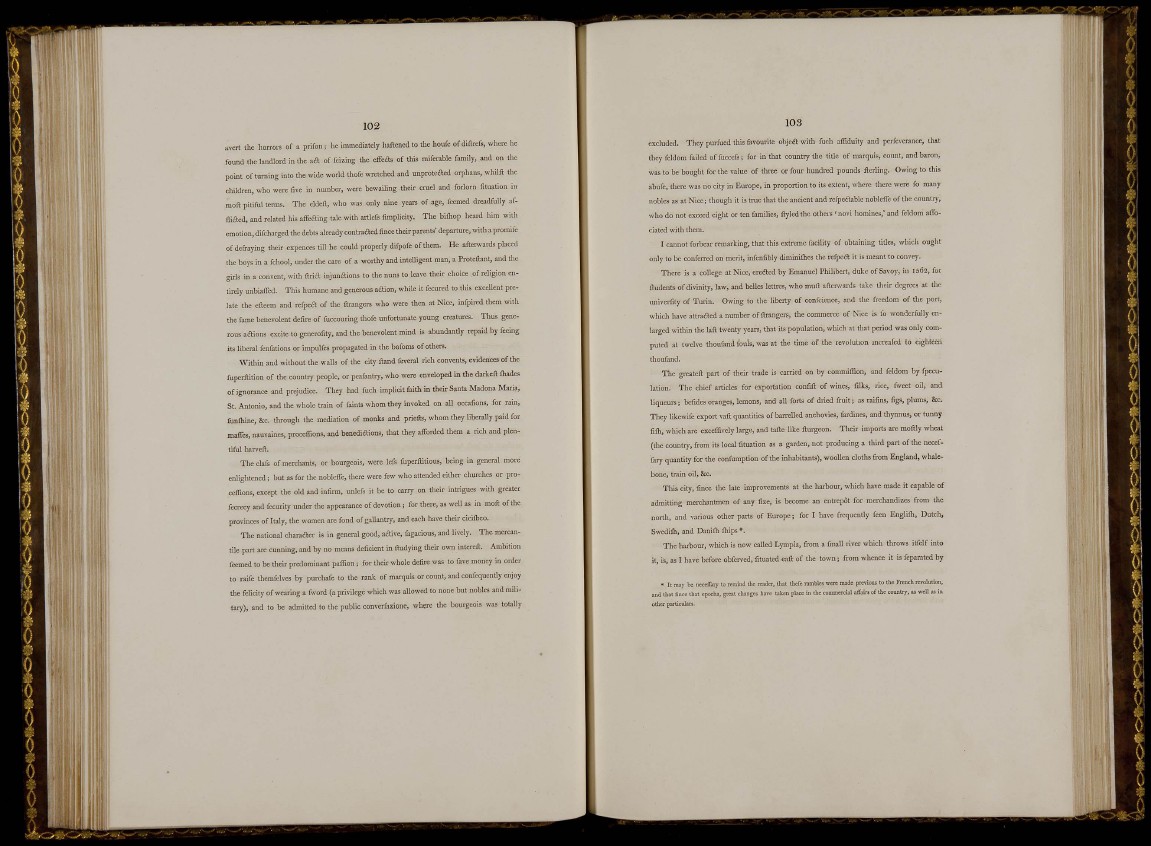
s lib I' '' ' . ,
[ N ; , 1
-I
102
Hvcrt the horrovs of a pr i fon; he immediatdy haftened to tlie houfe of diftrefs, where he
found the landlord in the a f t of felzing the efFefts of this niiferable family, and on tlic
point of t aming into the wide world thofe wretchcd and unprotcfted oi-phans, whilft the
cliildren, who were five in number, were bewaUiiig their cruel and forlorn fituation in
mod pitiful terms. T h e eldeft, who was only nine years of age, fccmed dreadfully afflifled,
and related his afFefting talc with arUefs fimplicity. T h e bifliop heard him with
emotion, difcharged the debts already contrafted fince their parents' departure, with a promifc
of defraying their expenccs till be could properly difpofe of them. He afterwards placed
the boys in a fchool, under the carc of a worthy and intelligent man, a Proteftant, and the
girls in a convent, with ftrift injunftions to the nuns to leave their choice of religion entirely
unbiafled. Thi s humane and generous aftion, while it fecured to this exceHent prelate
the cfteem and refpeft of the ftnmgers who were then at Nice, infpircd them with
the fame benevolent deiire of fuccouring thofe unfortunate young creatures. Thus generous
af t ions excite to generofity, and the benevolent mind is abundandy repaid by feeing
its liberal fenfations or impulies propagated in the bofoms of others.
Witliin and without the walls of the city ftand feveral rich convents, evidences of the
fuperftition of the country people, or peafantry, who were enveloped in the darkefl: ihadcs
of ignorance and prejudice. They had fuch imphcit faith in their Santa Madona Maria,
St. Antonio, and the whole train of laints whom they Invoked on all occafions, for rain,
funfhine, &c. through the mediation of monks and priefts, whom they liberally paid for
maffes, nauvaines, proceiEons, and benediftions, tliat they afforded them a rich and plentiful
harveft.
T h e clafs of mercliants, or bourgeois, were lefs fuperilitious, being in general more
enlightened; but as for the nobleffe, there were few who attended either chui-ches or proceffioDS,
except the old and infirm, unlefs it be to carry on their intrigues with greater
fecreey and fecurity under the appearance of devotion; for there, as well as in moil of the
provinces of Italy, the women are fond of gallantry, and each have their ciciibco.
T h e national charafter is in general good, aftive, fagaclous, and lively. T h e mercantile
part are cunning, and by no means deficient in ihidying their own intereft. Ambition
feemed to be their predominant pa f f ion; for their whole defire was to fave money in order
to raife themfelves by purchafe to the rank of marquis or count, and confequently enjoy
the felicity of wearing a fword (a privUege which was allowed to none but nobles and military),
and to be admitted to the public converfazione, where the bourgeois was totally
103
excluded. They purfued this favourite objcf t with fuch affiduity and perfeverance, diat
they feldoni failed of fuccefs ; for in that country die tide of marquis, count, and baron,
was to be bought for the value of three or four hundred pounds fterling. Owing to this
abufe, there was no city in Europe, in proportion to its extent, where there were fo many
nobles as at Nice j though it is true that the ancient and refpeélable nobleffe of the country,
who do not exceed eight or ten femiltes, flyledthc others 'novi homines," and feldom aflbciated
with them.
I cannot forbear remarking, that this extreme facility of obtaining titles, which ought
only to be conferred on merit, infenfibly diminlihes the refpcf t it is meant to convey.
There is a college at Nice, e r e f t e dby Emanuel Philibert, duke of Savoy, in 1502, for
fludents of divinity, law, and belles lettres, who muf t afterwards take their degrees at tlie
univerfity of Tur in. Owing to the liberty of confcience, and the freedom of tlie port,
whicli have attrafted a number of ftrangers, the commerce of Ni c e is fo wonderfully enlarged
within the laft twenty years, that its populadon, which at that period was only computed
at twelve thoufand fouls, was at the time of the revolution increafcd to eighteen
thoufand.
The greateft part of their trade is carried on by commiiEon, and feldom by fpeculation.
T h e chief articles for exportation confift of wines, filks, rice, fweet oil, and
liqueurs ; befides oranges, lemons, and all forts of dried fruit ; as raifins, figs, plums, &c.
They likewife export vail quantities of barrelled anchovies, fardines, and thynnus, or timny
fiih, which are exceffively large, and taile like fturgeon. Thei r impoit s are moftly wheat
(the country, from its local fituation as a garden, not producing a third part of the neceffary
quantity for the confumption of the inhabitants), woollen cloths from England, whalebone,
train oil, &c.
Thi s city, fince Uie late improvements at the harbour, which have made it capable of
admitting mercliantmen of any fize, is become an entrepôt for merchandizes from the
north, and various other parts of Europe ; for I have fi-equently feen Engl i ih, Dutch,
Swediih, and Dani fh Ihips * .
T h e harbour, which is now called Lympia, from a fmall river which throws itfelf into
it, is, as Ï have before obfcrved, iituated eaft of the town j from whence it is feparated by
iiïli'' .
•¡II"!'
* It may be necelTaiy to rcinbtl tlic reader, (liat lliefc ratnblea weie made pterious to the French revolution,
aiid tlmt fince that cpoel.a, great changes hare taken place in the commercial affairs of the country, as well as in
other prtieulars.
., 11' ' • I' .
hi ' m
f: